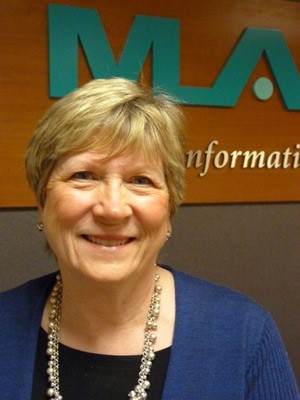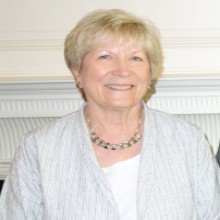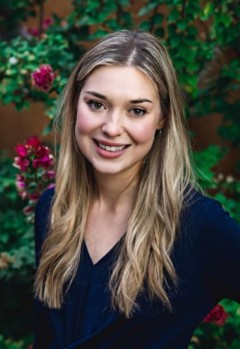
Alumna Carla Funk served as the executive director of the Medical Library Association (MLA) from 1992 to 2015. Image courtesy of the MLA
The Carla J. Funk Health Sciences Fellowship debuted spring semester of 2022, bringing the power of philanthropy, librarianship, and the health sciences together under one umbrella. Donor Carla Funk and inaugural recipient Heidi Yarger have spoken several times, finding delight in their special relationship. But what led up to the fellowship being given? Who is the donor and how did she decide to give money for a health sciences fellowship?
Alumna Carla Funk served as the executive director of the Medical Library Association (MLA) from 1992 to 2015. “I wanted to support the profession that supported me,” Funk says plainly when asked why she established a fellowship. Funk believes medical librarianship is of vital importance, so much so that even in retirement she is active on the board.
From library worker to executive director of MLA
“I wanted to donate to libraries in general, and IU libraries specifically because that was the beginning of this; because that's where I started my library journey.” Funk came to Indiana University in the late 1960s after receiving her bachelor’s degree in psychology from Northwestern. She arrived as a student wife and secured a job in the library order department. “I really enjoyed working there,” she shares.
Funk participated in the transition from Franklin Hall, where the old library was, to the brand-new Main Library, as Wells was known then. She decided to work part-time and get her Master of Library Science (MLS); after all, as she points out, “The library school was inside the library, so it was very convenient.” Funk remembers her time in Bloomington fondly and is grateful everything worked out so well.
Graduating in 1973, Funk moved to Illinois, working in several public libraries. In the early 1980s, she started at the American Medical Association (AMA) in Chicago, working first in the library and eventually becoming the director of the Medical Student Services Section. In 1992 Funk became the executive director of the Medical Library Association. As the fellowship page explains, “She was responsible for planning, coordinating, and executing the association’s programs and services, including its educational opportunities, publications, and legislative activities. She expanded and advanced roles for health sciences librarians, she increased scholarships to library school students with a special emphasis on underrepresented minorities, and she expanded research fellowship opportunities.”
In addition, Funk helped create Libraries Without Borders. She won numerous awards both in the United States and abroad. The MLA established the Carla J. Funk Governmental Relations Award, which recognizes medical librarians who collaborate and engage with governmental officials. In 2016, the IU Department of Library and Information Science, which now resides in Luddy Hall, honored her with the 2016 Distinguished Alumni Award in Library Science.
“It’s been a fascinating journey,” Funk says. “Learning the things I’ve learned and interacting with the people I've interacted with -- it really gives me a full appreciation of what my profession does.” Carla J. Funk is proud of the medical librarian profession.
From idea to fellowship
In 2018, Funk was introduced to Pete Rhoda, executive director of development of IU Libraries. Funk thought she would simply give IU Libraries money, they’d buy books, and that would be it. However, Rhoda began sending Funk information on the teaching and research footprint IU Libraries was embarking on, especially in relation to the Sciences Library. Looking back on it, Funk feels learning about the research mission and teaching activities of IU librarians was crucial to the development of the fellowship.
“Pete (Rhoda) was great throughout this journey, connecting me with people, sending me links to things that were going on, and what kind of things were happening as we worked through what it would be that I was donating to.” Rhoda also introduced her to the IU alumni circle in Chicago, which she enjoyed.
When the pandemic hit, they had started formulating the fellowship. “Pete (Rhoda) kept sending me links with all the activities of the library, both national and global.” Importantly, he connected Funk with Jennifer Simms, Head of the Sciences Library. Rhoda would write criteria and send them to Funk who would then comment on the document. Changes would be made, but in the end “It was really very well done.”
The resulting fellowship is open to upper-level undergraduates and graduate students studying at the Luddy School of Informatics, Computing, and Engineering with a focus on health-related fields. The paid, one-semester fellowship fosters collaboration and support between the Bloomington Regional Academic Health Center (RHAC) at the hospital and the schools supporting it. The goal is to facilitate the accurate sharing of information via the lens of an academic library.


